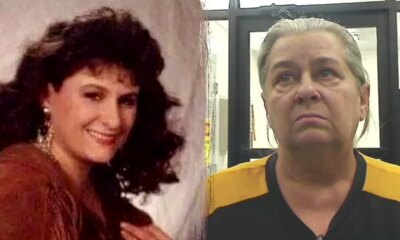Lifestyle
Kris Kristofferson, musical rebel and movie star, has died at age 88

Kris Kristofferson, photographed in 2002 in Los Angeles.
Frederick M. Brown/Getty Images
hide caption
toggle caption
Frederick M. Brown/Getty Images
Kris Kristofferson, who wrote indelible songs about lovers, loners, boozers and a footloose pair of hitchhikers — and who later became a screen star, appearing in dozens of films — has died at age 88.
According to his representative, the singer, songwriter and actor died peacefully in his home in Maui, Hawaii, on Saturday, Sept. 28, surrounded by family. No cause of death was shared.
Kristofferson made his name as a songwriter in Nashville starting in the late 1960s, penning songs including “Me and Bobby McGee,” “Sunday Morning Coming Down” and “Help Me Make It Through the Night,” which other singers (Janis Joplin, Johnny Cash and Sammi Smith, respectively) took to the top of the charts.
His fame and sex symbol status grew through his movie roles, most notably when he co-starred with Barbra Streisand in the 1976 remake of A Star is Born.
“I imagined myself into a pretty full life,” Kristofferson told NPR’s Fresh Air in 1999. “I was certainly not equipped, by God, to be a football player, but I got to be one. And I got to be a Ranger, and a paratrooper, and a helicopter pilot, you know, and a boxer, and a lot of things that I don’t think I was built to do. I just imagined ’em.”
Kristofferson won three Grammy awards, two of them for duets with his then-wife Rita Coolidge, to whom he was married from 1973-80. His performance in A Star Is Born earned him a Golden Globe in 1976.
In 2004, Kristofferson was inducted into the Country Music Hall of Fame, and in 2014, he was honored with a Grammy Lifetime Achievement Award.
Early on, he found his calling as a writer
Kristofferson was born in Brownsville, Texas to a military family; his father was a major general in the U.S. Air Force. It was there, at age 11, that he wrote his first song, titled “I Hate Your Ugly Face.” (He included that number as a bonus track on one of his last albums, Closer to the Bone, in 2009.)
At Pomona College in southern California, Kristofferson majored in creative literature. His many diverse talents drew the attention of Sports Illustrated, which highlighted him as one of its “Faces in the Crowd” in 1954. “This dashing young man,” the magazine trumpeted, not only played rugby and varsity football and was a Golden Gloves boxer; he was also sports editor of the college paper, a folk singer, an award-winning writer and an “outstanding” ROTC cadet.
From Pomona, Kristofferson won a prestigious Rhodes Scholarship to study at Oxford University, where he dove into the works of Shakespeare and William Blake.
In a 1999 interview with NPR’s Morning Edition, he explained that Blake “was a wonderful example for somebody who wanted to be an artist, because he believed if you were cut out to be one, it was your moral responsibility to be one, or you’d be haunted throughout your life and after death — ’til eternity!”
Perhaps inspired by Blake’s admonition, Kristofferson harbored dreams of writing the Great American Novel. Instead, after Oxford he followed his father into the military, joining the U.S. Army, where he became a helicopter pilot and attained the rank of Captain. Assigned to teach literature at West Point, Kristofferson decided to ditch the Army, and he moved to Nashville to pursue his dream of songwriting.
For that choice, he was disowned by his parents. “They thought that somewhere between Oxford and the Army I had gone crazy,” Kristofferson told Pomona College Magazine in 2004. “My mother said nobody over 14 listens to that kind of stuff anyway…. But I was more and more determined to go that way. And being virtually disowned was kind of liberating for me, because I had nothing left to lose.”
From janitor to hit songwriter
Arriving in Nashville in 1965, Kristofferson got a job as a janitor at Columbia Studios, sweeping floors and emptying ashtrays, while writing songs on the side.
He often compared the creative ferment of Nashville in the ’60s to that of Paris in the ’20s. “When I got there,” he said in the 1999 Fresh Air interview, “it was so different from any life that I’d been in before; just hanging out with these people who stayed up for three or four days at a time, and nights, and were writing songs all the time.”
“I think I wrote four songs during the first week I was there,” he continued. “And it was just so exciting to me. It was like a lifeboat, you know? It was like my salvation.”
The story goes that Kristofferson was so desperate to get his songs into the hands of Johnny Cash that he landed a helicopter on Cash’s lawn. In the version Cash used to tell, Kristofferson emerged with a tape in one hand and a beer in the other.
“It’s a great story, and a story that good needs to be believed, even if it’s not true,” quips musician Rodney Crowell, who became Cash’s son-in-law when he married Rosanne Cash. “But, you know, according to John, that literally happened.”
Johnny Cash would turn out to be instrumental in launching Kristofferson’s career, introducing him at the 1969 Newport Folk Festival and inviting him to perform on his television variety show.
His songs were like short stories
Rodney Crowell was one of many young songwriters who were drawn to Nashville by the beacon of Kristofferson’s success. “Because of Kris Kristofferson, a lot of songwriters came into Nashville, came in droves. And I was part of that wave,” he tells NPR.
What set Kristofferson’s music apart, Crowell says, was the way he wove a story and sustained a narrative through his songs. Take “Sunday Morning Coming Down,” for example — a vivid portrait of bleak, hungover loneliness. Crowell calls the song “a beautifully-written short story.”
“Well I woke up Sunday morning with no way to hold my head that didn’t hurt
And the beer I had for breakfast wasn’t bad, so I had one more for dessert
Then I fumbled through my closet for my clothes and found my cleanest dirty shirt
And I shaved my face and combed my hair and stumbled down the stairs to meet the day”
In the world of Nashville songwriters, lyrics like this were a revelation. “Along comes Kris, a Rhodes Scholar with a high IQ and a very poetic sensibility,” Crowell says. “Kris brought it. He brought it in a big way.”
Musician Steve Earle recalls that when he first heard “Sunday Morning Coming Down” as a teenager in Texas, it made such an impact that he rushed out to buy Kristofferson’s first two records.
“The imagery and the use of language is just being cranked up to a level higher than really anything that came before in country music, for sure,” Earle says.
Kristofferson, he says, “raised the bar single-handedly in country music lyrically to a place that writers are still aspiring to, and I still aspire to, to this day.“
He was a master of seduction, in song and on screen
For Nashville, Kristofferson’s 1970 song of naked, unapologetic desire, “Help Me Make It Through the Night,” was nothing short of revolutionary. “It was earth-shaking, and a paradigm shift,” Crowell says. “It is literally a form of seduction. It’s silver-tongue seduction.”
“Take the ribbon from your hair
Shake it loose and let it fall
Layin’ soft upon my skin
Like the shadows on the wall
Come and lay down by my side
‘Til the early morning light
All I’m takin’ is your time
Help me make it through the night”
“There’s a description of intimacy in it that probably had never existed before,” Earle says. “And of course, when other people, lesser songwriters, tried to do it, it became smut.”
In person and on the screen, Kristofferson was magnetic: movie-star gorgeous, with a roguish grin and electric blue eyes.
“Women loved him, you know? I mean, absolutely fell over,” Crowell says. “He was a sex symbol and a rock star.”
For a young, eager musician like Crowell, Kristofferson offered an intoxicating role model.
“It was like, ‘Hmm, I want to be like that,’” Crowell says. “I was like, ‘How do you do that? How do you have that kind of swagger?’”
Kristofferson brought that same sensual swagger to his movie roles over his decades-long career. He starred in films including Pat Garrett and Billy the Kid, Alice Doesn’t Live Here Anymore, A Star Is Born, Semi-Tough, Heaven’s Gate and Lone Star, working with directors Sam Peckinpah, Martin Scorsese, Alan Rudolph and John Sayles, among others.
For a stretch in the 1980s and ’90s, Kristofferson was part of an occasional country outlaw supergroup, joining with Johnny Cash, Waylon Jennings and Willie Nelson to form the Highwaymen. Recalling that time in an interview with the British magazine Classic Rock years later, he said, “I just wish I was more aware of how lucky I was to share a stage with those people. I had no idea that two of them [Cash and Jennings] would be done so soon. Hell, I was up there and I had all my heroes with me – these are guys whose ashtrays I used to clean. I’m kinda amazed I wasn’t more amazed.”
In the ’80s and ’90s, Kristofferson also embraced a number of leftist political causes. He protested nuclear testing in Nevada, and vocally opposed U.S. policy in Central America, making several trips to Nicaragua in support of the Sandinista government, and excoriating the U.S. backing of El Salvador’s military-led junta in that country’s brutal civil war. “I’m a songwriter,” he said in a 1988 Fresh Air interview, “but I’m also concerned with my fellow human beings. And I’m real concerned with the soul of my country.” His 1990 album, Third World Warrior, is filled with songs expressing his political views:
“Broken rules and dirty warriors spreading lies and secret funds
Can’t defeat the Campesino with their money and their guns
Cause he’s fighting for his future and his freedom and his sons
In the third world war”
Music connected him to memory
In his later years, Kristofferson suffered from profound memory loss, but he kept performing up until 2020. Among those he shared the stage with was Margo Price. “Without a doubt,” she says, “he still had all the same charisma and all the sex appeal, every time.”
On stage, Price says, Kristofferson could connect with his musical memories and “feel like he was himself…. There’s been times where I’ve got off stage with Kris and I’m like, ‘Great show, Kris!’ He’s like, ‘Oh, thanks. You know, I wish I could have been there!’ I mean, that was the powerful thing about seeing him perform his songs, was that he could remember songs he’d written so long ago, but yet not remember something from five minutes ago.”
In an interview with NPR in 2013, Kristofferson reflected on his life and career. At 76, he had just released an album titled Feeling Mortal.
“To my surprise,” he told Rachel Martin, “I feel nothing but gratitude for being this old, and still above ground, living with the people I love. I’ve had a life of all kinds of experiences, most of ’em good. I got eight kids and a wife that puts up with everything I do, and keeps me out of trouble.”
Kristofferson lived for many years on the island of Maui, in a home built high on the slope of the Haleakala volcano, with a panoramic view of the Pacific Ocean. He told an interviewer in 2015, “I’ve had so much blessing, so much reward for my life that I want to stay right where I am, which is on an island with no neighbors and 180 degrees of empty horizon. It’s a beautiful view.”

Lifestyle
‘Hamnet’ star Jessie Buckley looks for the ‘shadowy bits’ of her characters

Jessie Buckley has been nominated for an Academy Award for best actress for her portrayal of William Shakespeare’s wife in Hamnet.
Kate Green/Getty Images
hide caption
toggle caption
Kate Green/Getty Images
Actor Jessie Buckley says she’s always been drawn to the “shadowy bits” of her characters — aspects that are disobedient, or “too much.” Perhaps that’s what led her to play Agnes, the wife of William Shakespeare, in Hamnet.
Buckley says the film, which is based on Maggie O’Farrell’s 2020 novel, offered a chance to counter a common narrative about the playwright’s wife: that she “had kept him back from his genius,” Buckley says.

But, she adds, “What Maggie O’Farrell so brilliantly did, not just with Agnes and Shakespeare’s wife, but also with Hamnet, their son, was to bring these people … and give them status beside this great man. … [And] give the full landscape of what it is to be a woman.”
The film is nominated for eight Academy Awards, including best actress for Buckley. In it, she plays a woman deeply connected to nature, who faces conflicts in her marriage, as well as the death of their son Hamnet.
Buckley found out she was pregnant a week after the film wrapped. She’s since given birth to her first child, a daughter.

“The thing that this story offered me, that brought me into this next chapter of my life as a mother was tenderness,” she says. “A mother’s tenderness is ferocious. To love, to birth is no joke. To be born is no joke. And the minute something’s born into the world, you’re always in the precipice of life and death. That’s our path. … I wanted to be a mother so much that that overrode the thought of being afraid of it.”

Jessie Buckley stars as Agnes and Joe Alwyn plays her brother Bartholomew in Hamnet.
Courtesy of Focus Features/Courtesy of Focus Features
hide caption
toggle caption
Courtesy of Focus Features/Courtesy of Focus Features
Interview highlights
On filming the scene where she howls in grief when her son dies
I didn’t know that that was going to happen or come out, it wasn’t in the script. I think really [director] Chloé [Zhao] asked all of us to dare to be as present as possible. Of course, leading up to it, you’re aware this scene is coming, but that scene doesn’t stand on its own. By the time I’d met that scene, I had developed such a deep bond with Jacobi Jupe, who plays Hamnet, and [co-stars] Paul [Mescal] and Emily Watson, and all the children and we really were a family. And Jacobi Jupe who plays Hamnet is such an incredible little actor and an incredible soul, and we really were a team. …

The death of a child is unfathomable. I don’t know where it begins and ends. Out of utter respect, I tried to touch an imaginary truth of it in our story as best I could, but there’s no way to define that kind of grief. I’m sure it’s different for so many people. And in that moment, all I had was my imagination but also this relationship that was right in front of me with this little boy and that’s what came out of that.
On what inspired her to pursue singing growing up
I grew up around a lot of music. My mom is a harpist and a singer and my dad has always been passionate about music, so it was always something in our house and always something that was encouraged. … Early on, I have very strong memories of seeing and hearing my mom sing in church and this quite intense mercurial conversation that would happen between her, the story and the people that would listen to her. And at the end of it, something had been cracked between them and these strangers would come up with tears in their eyes. And I guess I saw the power of storytelling through my mom’s singing at a very young age, and that was definitely something that made me think I want to do that.
On her first big break performing as a teen on the BBC singing competition I’d Do Anything — and being criticized by judges about her physical appearance
I was raw. I hadn’t trained. I had a lot to learn and to grow in. I was only 17. I think there was part of their criticism which I think was destructive and unfair when it became about my awkwardness, or they would say I was masculine and send me to kind of a femininity school. … They sent me to [the musical production of] Chicago to put heels on and a leotard and learn how to walk in high heels, which was pretty humiliating, to be honest, and I’m sad about that because I think I was discovering myself as a young woman in the world and wasn’t fully formed. … I was different. I was wild, I had a lot of feeling inside me. I could hardly keep my hands beside myself and I think to kind of criticize a body of a young woman at that time and to make her feel conscious of that was lazy and, I think, boring.
On filming parts of the 2026 film The Bride! while pregnant
I really loved working when I was pregnant. I thought it was a pretty wild experience, especially because I was playing Mary Shelley and I was talking about [this] monstrosity, and here I was with two heartbeats inside me. Becoming a mom and being pregnant did something, I think, for me. My experience of it, it’s so real that it really focuses [me to be] allergic to fake or to disconnection.
Since my daughter has come and I know what that connection is and the real feeling of being in a relationship with somebody … as an actress, it’s very exciting to recognize that in yourself and really take ownership of yourself.
I’m excited to go back and work on this other side of becoming a mother in so many ways, because I’ve shed 10 layers of skin by loving more and experiencing life in such a new way with my daughter. I’m also scared to work again because it’s hard to be a mother and to work. That’s like a constant tug because I love what I do and I’m passionate and I want to continue to grow and learn and fill those spaces that are yet to be filled — and also be a mother. And I think every mother can recognize that tug.
On the possibility of bringing her daughter to travel with her as she works
I haven’t filmed for nearly a year and I cannot wait. I’m hungry to create again. And my daughter will come with me. She’s seven months, so at the moment she can travel with us and it’s a beautiful life. And she meets all these amazing people and I have a feeling that she loves life and that’s a great thing to see in a child. And I hope that’s something that I’ve imparted to her in the short time that she’s been on this earth is that life is beautiful and great and complex and alive and there’s no part of you that needs to be less in your life. You might have to work it out, but it’s worth it.
Lauren Krenzel and Susan Nyakundi produced and edited this interview for broadcast. Bridget Bentz, Molly Seavy-Nesper and Beth Novey adapted it for the web.
Lifestyle
‘Evil Dead’ Star Bruce Campbell Reveals He Has Cancer

Bruce Campbell
I’m Battling Cancer
Published
Bruce Campbell has revealed he has cancer, but says it’s a type that’s treatable, though not curable.
“The Evil Dead” actor shared the news Monday in a message to fans, writing, “Hi folks, these days, when someone is having a health issue, it’s referred to as an ‘opportunity,’ so let’s go with that — I’m having one of those.” He continued, “It’s also called a type of cancer that’s ‘treatable’ not ‘curable.’ I apologize if that’s a shock — it was to me too.”
Campbell said he wouldn’t go into further detail about his diagnosis, but explained his work schedule will be changing. “Appearances and cons and work in general need to take back seat to treatment,” he wrote, adding he plans to focus on getting “as well as I possibly can over the summer.”
As a result, Campbell says he has to cancel several convention appearances this summer, noting, “Treatment needs and professional obligations don’t always go hand-in-hand.”
He says his plan is to tour this fall in support of his new film, “Ernie & Emma,” which he stars in and directs.
Ending on a determined note, Campbell told fans, “I am a tough old son-of-a-bitch … and I expect to be around a while.”
Lifestyle
‘Scream 7’ takes a weak stab at continuing the franchise : Pop Culture Happy Hour

Neve Campbell in Scream 7.
Paramount Pictures
hide caption
toggle caption
Paramount Pictures
The OG Scream Queen Neve Campbell returns. Scream 7 re-centers the franchise back on Sidney Prescott. She has a new life, a family, and lots of baggage. You know the drill: Someone dressing up as the masked slasher Ghostface comes for her, her family and friends. There’s lots of stabbing and murder and so many red herrings it’s practically a smorgasbord.
Follow Pop Culture Happy Hour on Letterboxd at letterboxd.com/nprpopculture
-

 World5 days ago
World5 days agoExclusive: DeepSeek withholds latest AI model from US chipmakers including Nvidia, sources say
-

 Massachusetts6 days ago
Massachusetts6 days agoMother and daughter injured in Taunton house explosion
-

 Denver, CO6 days ago
Denver, CO6 days ago10 acres charred, 5 injured in Thornton grass fire, evacuation orders lifted
-

 Louisiana1 week ago
Louisiana1 week agoWildfire near Gum Swamp Road in Livingston Parish now under control; more than 200 acres burned
-

 Oregon4 days ago
Oregon4 days ago2026 OSAA Oregon Wrestling State Championship Results And Brackets – FloWrestling
-

 Technology1 week ago
Technology1 week agoArturia’s FX Collection 6 adds two new effects and a $99 intro version
-

 News1 week ago
News1 week agoVideo: How Lunar New Year Traditions Take Root Across America
-

 Florida2 days ago
Florida2 days agoFlorida man rescued after being stuck in shoulder-deep mud for days


















